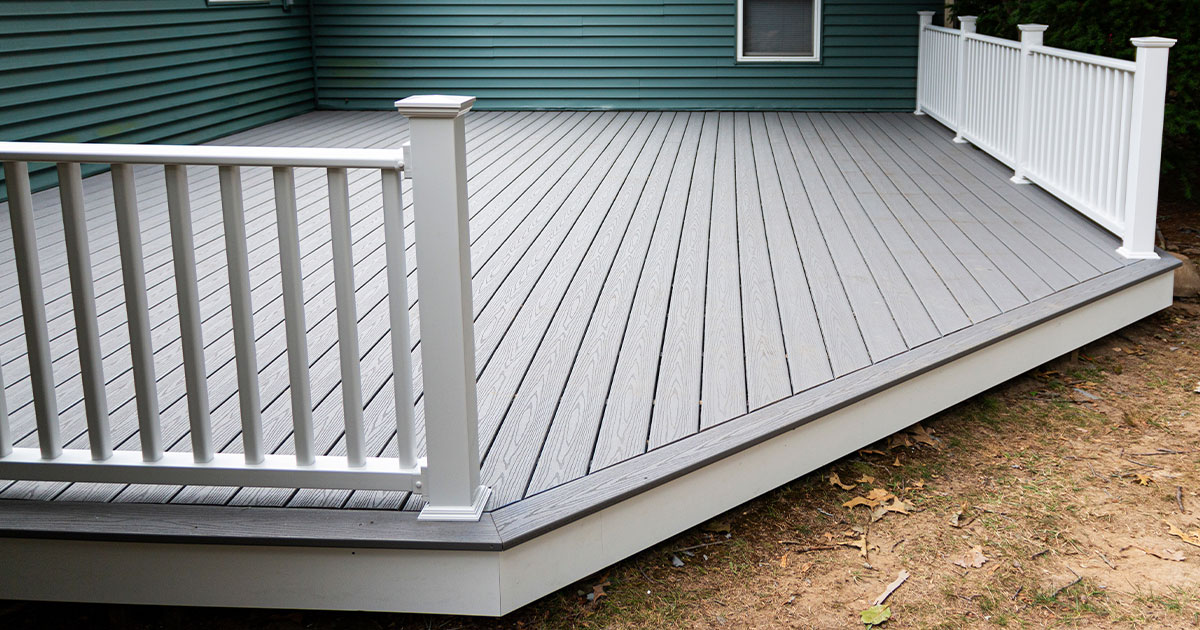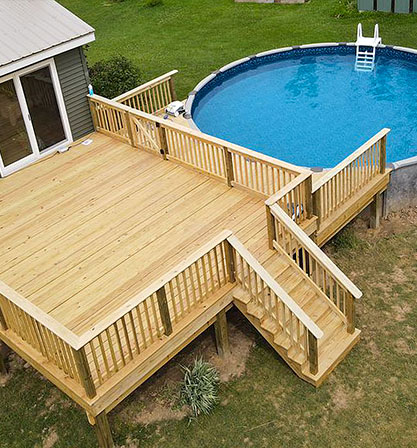Choosing the right materials is crucial when preparing for your deck installation project.
Choosing the right materials is crucial when preparing for your deck installation project.
Blog Article
How to Pick the Right Products for Your Deck Setup Job
Selecting the proper materials for your deck installation job can appear overwhelming. The trick is to balance your spending plan, layout choices, and way of living requires to create a deck that will certainly enhance your outside area for years to come.
Understanding the Different Kinds of Deck Materials
When starting a deck setup project, the option of products becomes a pivotal choice. Different alternatives are available, each with special characteristics and visual charm. Conventional wood, for circumstances, uses an ageless, natural appearance and is commonly more affordable. It can warp over time and requires normal upkeep. Composite materials, on the other hand, are a mix of timber and plastic, supplying toughness and resistance to weather elements. They demand less maintenance compared to wood yet are normally a lot more expensive. Another choice is vinyl, which is virtually maintenance-free and immune to insects and rot, albeit much less natural-looking. By comprehending these distinctions, house owners can make a more informed choice on the most suitable deck product for their specific requirements.
Evaluating the Toughness and Maintenance Demands of Deck Materials
Assessing the longevity and maintenance requirements of deck products is a vital action in deck installation. Sturdiness involves the material's ability to stand up to rough climate condition, damage, and its longevity. As an example, cedar and redwood are naturally resistant to rot and bugs, making them durable options. On the other hand, pressure-treated timber, while durable, might need even more upkeep because of its sensitivity to breaking and buckling.
Recognizing maintenance demands is just as important. Some products call for regular securing or discoloring to preserve their look and resist wetness damages, while others, like composite outdoor decking, demand much less upkeep. By evaluating these elements, one can pick one of the most appropriate decking material, guaranteeing an equilibrium in between sturdiness, maintenance needs, and visual allure.
Cost Analysis: Contrasting Wood and Compound Decking
Although expense might at first seem like a second worry, it is a considerable variable when comparing wood and composite decking. On the various other hand, composite outdoor decking, while more expensive originally, calls for much less maintenance, possibly lowering long-lasting costs. Potential deck proprietors must consider their budget and readiness to keep their decks when choosing in between timber and composite decking.
Aesthetic Appeals and Style Flexibility of Decking Materials
All-natural wood outdoor decking supplies a classic, timeless look, while composite products offer a vast array of shades and structures to match diverse preferences and styles. Compound materials, while less versatile in layout, are still versatile enough for the majority of deck styles. These factors, for that reason, are important determinants in the choice of decking material.
Environmental Impact of Decking Materials
When picking decking materials, one need to take into consideration not only appearances and longevity, but additionally the ecological impact. It's important to evaluate the sustainability of products and explore recycled outdoor decking choices. Additionally, understanding the prospective influence on regional ecosystems will guarantee a more ecologically accountable option.
Analyzing Product Sustainability
In the realm of deck building and construction, analyzing material sustainability is an important action. This includes reviewing the ecological effect of each possible material, taking into consideration elements such as the energy needed for its manufacturing, its carbon footprint, and its end-of-life disposal or recycling options. Timber is a renewable resource, however unsustainable logging techniques can lead to deforestation. Composite decking products frequently integrate timber and plastic, minimizing the need for new hardwood yet raising dependence on fossil gas. Light weight aluminum and other steels might be much more sturdy and recyclable, but their extraction and processing can be energy-intensive. Therefore, the selection of outdoor decking products need to balance functionality, appearances, cost, and sustainability to make sure an accountable and long-lasting installment.
Recycled Decking Choices

Composite decking is particularly prominent as a result of its durability and simplicity of upkeep. It's resistant to rot, pests, and fading, making it a long-lasting option. Recycled plastic decking, on the other hand, is very resistant and requires very little upkeep. While these materials may carry a higher first cost, their longevity and decreased environmental impact make them a smart financial investment for the eco-conscious homeowner.

Effect On Local Ecosystems
While the advantages of using recycled materials for decking can not be overemphasized, it's equally vital to consider the more comprehensive ecological navigate to this site effects of these choices. Proper disposal of old decking is crucial to minimizing garbage dump waste. Basically, an eco-conscious deck job demands mindful product choice, sustainable sourcing, and responsible disposal.
Making Your Decision: Tips for Choosing the very best Deck Materials
As the article transitions right into the subtopic of "Making Your Final Decision: Tips for Choosing the Best Deck Products", it is critical to understand the selection of deck materials readily available. Striking an equilibrium between toughness and looks is necessary in this choice process. The following conversation will certainly guide visitors in making an enlightened selection based on these vital factors to consider.
Recognizing Various Deck Products
The task of choosing the right products for your deck setup can seem intimidating due to the huge range of alternatives offered. Understanding the different products can streamline this process. Wood is a prominent option, providing a traditional aesthetic and cost. Kinds of wood used consist of pressure-treated lumber, cedar, and redwood. Compound materials, made from a blend of timber and plastic, are low-maintenance and resistant to rot and insects. Vinyl or PVC decks are also a lot more sturdy and call for much less maintenance than composite products, yet they can look less all-natural. Light weight aluminum decks are strong, lightweight, and immune to rot, however they are likewise the most expensive option. Each product has its very own benefits and disadvantages, making it essential to consider your certain requirements before making a final decision.
Toughness vs. Appearances Balance
Stabilizing resilience with looks can be a challenge when choosing deck materials. The decision frequently comes down to individual choices and the deck's planned use. High-traffic locations may demand long lasting materials like composite decking, which stands up to damage however may do not have the all-natural Clicking Here charm of wood. On the various other hand, timber provides a timeless appeal and warmth that synthetic materials struggle to reproduce. It requires a lot more upkeep and might not last as long. Consequently, property owners need to strike an equilibrium, taking into consideration both the deck's useful demands and their visual preferences. By doing so, they can ensure their deck remains a functional and attractive outdoor room for several years to find.
Final thought
In conclusion, choosing the right products for your deck setup task needs cautious consideration of factors such as resilience, maintenance, price, appearances, and ecological influence. Whether you choose typical timber or composite materials, your option needs to straighten with your spending plan, design choices, and lifestyle. Inevitably, the ideal decking product is one that enhances your exterior space and offers link pleasure for many years to find.
Report this page